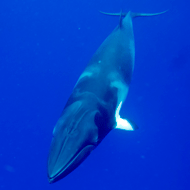Japan to resume commercial whaling

It has been reported that Japan intends to target minke, sei and Bryde’s whales, but it is not clear how many of each species will be taken.
Japan’s decision to withdraw from the International Whaling Commission (IWC) and resume commercial whaling sets a “dangerous example”, conservationists have said.
Commercial whaling was banned in 1982 after it became clear that the number of whales being killed was unsustainable and jeopardised populations.
Japan has since continued to hunt whales for ‘research purposes’ - utilising a loophole in the ban. However, the country’s chief cabinet secretary Yoshihide Suga, has confirmed that commercial hunts will start again in July 2019, in Japan’s territorial waters and its exclusive economic zone.
The move has been widely condemned by conservationists and politicians alike. Environment minister Michael Gove said in a tweet that he was ‘extremely disappointed’, adding: ‘The UK is strongly opposed to commercial whaling and will continue to fight for the protection and welfare of these majestic animals.’
Astrid Fuchs, programme lead at Whale and Dolphin Conservation (WDC) said it was “devastating news for the whales” and warned that the decision could “destroy all the progress that has been made internationally in order to protect and conserve the great whale species”.
She added: “The moratorium on commercial whaling is one of the biggest achievements of modern conservation. By resuming whaling outside IWC oversight Japan sets a dangerous example.
“Many whale species are still struggling to recover from the effects of the mass slaughter that was industrial whaling in the 20th century. All whale populations are already under threat from issues like climate change, pollution, entanglement and habitat degradation. The last thing they need is a resumption of large scale whaling.”
It has been reported that Japan intends to target minke, sei and Bryde’s whales, but it is not clear how many of each species will be taken.



 The latest
The latest